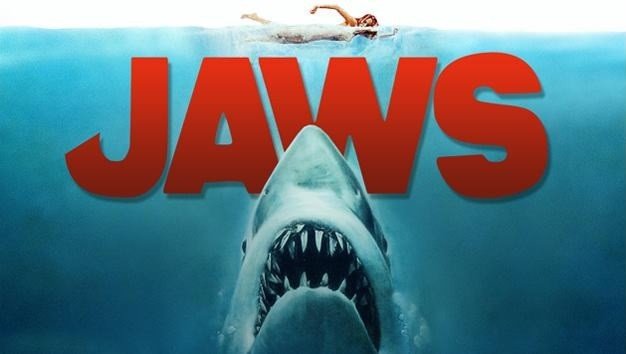JAWS may have been a nail-biting thriller on screen, but on the set it was more like a disaster movie – with so many problems that the film crew nick-named it “Flaws”.
While it became cinema’s first summer blockbuster, it was almost sunk by feuding cast members, problems with the mechanical shark and a voracious budget that quickly ran out.


The artificial man-eater slipped to the bottom of the sea, a propeller nearly sliced off an actor’s head and some of the cast got seasick.
Now Ian Shaw, whose father Robert played hard-bitten sailor Quint, has written a play about the making of the 1975 movie.
The Shark Is Broken focuses on the bitter rows between warring cast members Robert, Richard Dreyfuss and Roy Scheider.
The trio spent many hours waiting for director Steven Spielberg to shout “Action!” again in the much-delayed shoot, which overran by more than three months.
While researching and writing the script, Ian, 51, was forced to face up to the troubling behaviour of his late father on the movie’s set.
The heavy-drinking Brit boozed during the production and turned his fire on his young co-star Dreyfuss.
The American actor, who went on to win a best actor Oscar for 1977 film The Goodbye Girl, responded by chucking his tormentor’s bottle of whisky into the Atlantic.
That, Ian reveals, only made matters far worse. He tells The Sun: “That was the incendiary moment.
“I think Richard probably had the best intentions, I think he felt that Robert was overdoing it, that he would help him out by removing the booze.
“But no, that was a big mistake. I think he regretted doing it.”
Robert, who died aged just 51 in 1978, repeatedly taunted the then 27-year-old Richard as they filmed on board the Orca, Quint’s boat in the movie.
At one point he goaded Richard: “I’ll give you a 100 bucks if you climb up to the top of the mast on the Orca and jump off into the water.”
Ian says: “I believe Robert also fired a fire extinguisher at Richard’s face while he was trying to do some acting. That didn’t go down well with Richard.”
The two stars failed to see eye to eye from the off.
Ian continues: “Robert was this very established old-school British theatre actor and writer.
I think Richard probably had the best intentions, I think he felt that Robert was overdoing it, that he would help him out by removing the boozeIan Shaw
“I think he felt Richard was quite brash and self-absorbed and he wanted to take him down a peg or two, because Richard wasn’t famous at that point.”
Fortunately, the friction did make for two unforgettable performances.
The tension between Shaw’s man-of-the-world shark hunter and Dreyfuss’s well educated oceanographer Matt Hooper lit up cinemas.
That was a small mercy for Steven Spielberg, who had to deal with the toxic atmosphere on top of countless other headaches.
Even before he stepped on to the set in Martha’s Vineyard, on America’s north east coast, the production seemed doomed.
Spielberg wanted to switch to another movie, the script wasn’t ready and the three actors were only hired nine days before the production started.
The film was adapted from the novel by Peter Benchley, which Robert had called a “piece of s**t” and he had only been persuaded to do it by his wife.
It was the first time a major movie had been filmed on the ocean and Spielberg, aged just 27, was out of his depth.
I couldn’t separate that in my head. I knew it was just acting, but I was still terrified of sharks and I didn’t swim for a couple of years, even in a pool. I was too scaredIan Shaw
Sensibly, the original plan to attempt to train a REAL great white shark was ditched, but the pneumatic artificial replacements were not particularly seaworthy.
Two had to be recovered after sinking and others seized up as salt water got in the works.
Ian, who joined his father on set aged five, recalls: “On the walkie-talkie on the set the whole time it was, ‘The shark is not working. The shark is broken’ — that’s where the title of my play came from.”
But to a young boy the life-sized mechanical beast was fascinating.
He says: “I do remember meeting Bruce, the name given to the shark, after Steven Spielberg’s lawyer.
“It was under wraps, because they wanted it to be the big reveal in the movie. I was allowed a glimpse of its face. I remember Steven Spielberg hopping about very excitedly.”
That excitement slowly drained away. The cast got seasick and the Orca also began to sink at one point.
What was supposed to be a 55-day shoot continued for 159 days. As a result, Spielberg ran out of money and there were doubts that the studio would cough up any more.
But Robert was so convinced it would be a hit that he offered his own support.
Ian reveals: “When the budget went bankrupt, Robert offered to defer wages so that Steven could finish the film, because he believed in him.
“He wasn’t sure it would be an artistic success, but he did think it would be a commercial success.”
One of the most memorable scenes in the film is when former navy man Quint recounts his encounter with sharks after the USS Indianapolis warship sank off the Philippines during World War Two. Of the 890 men who went into the water, only 316 survived, many taken by sharks.
Robert, who re-wrote the final draft of the dialogue, got drunk during one of the takes in a bid to make it seem realistic, but he went too far.
When the budget went bankrupt, Robert offered to defer wages so that Steven could finish the film, because he believed in him
Ian says: “He got permission from Steven Spielberg to have a few drinks, but unfortunately that spiralled into a few too many and so when they shot it, he wasn’t able to complete the scene. I think they used the beginning in the final cut.
“Robert woke up at two o’clock in the morning and rang Steven incredibly apologetic, because he was a very professional actor normally, despite the drinking. He begged Steven to be able to complete it the next day, which they did, and Steven was so delighted with it.”
Robert, who was married three times and had ten children, was one of a group of hard-drinking, hell-raising actors in the Sixties.
Ian, who is also an actor and has appeared in films and TV shows in supporting roles, says: “With Jaws he did drink, but he didn’t miss any lines and he gave a good performance.
“We are a different generation now. A whole load of actors back then, Richard Burton, Peter O’Toole, they all drank.
“Later in life he’d have preferred not to be drinking so much.”
Off screen Ian saw a very different side of the actor. He says: “As a family, and there are ten children he left behind who all love him, we found him very affectionate and funny, a good man.”
With the same chiselled chin, mutton chop sideburns and moustache, Ian is the spitting image of his late father.
So it made sense to cast himself in the role of his dad in the stage play, which has transferred to London’s West End after receiving rave reviews at Edinburgh’s Fringe Festival in 2019.
Ian, who co-wrote the script with Joseph Nixon, feels closer to his father by playing him every night.
He says: “I do feel a kinship to him. I had great reservations about doing it, portraying the flaws.”
When Robert died from a heart attack while driving to his home in County Mayo in Ireland in 1978, it meant Ian was suddenly parentless.
His mum, Oscar-nominated actress Mary Ure, had died aged 42 from an accidental overdose when Ian was just four.
With Jaws he did drink, but he didn’t miss any lines and he gave a good performanceIan Shaw
He says: “The worst of it was losing my mother and father. We went through a lot of grief.”
But he insists that despite his dad dying when he was eight, he still had an “idyllic” childhood.
He says: “I had brothers and sisters who were really affectionate and loving people and I had a wonderful stepmother, Virginia.”
Jaws eased the financial burden of ten children, because its success meant that Robert — already well known after playing assassin Donovan Grant in 1963 Bond film From Russia With Love — could command much bigger fees.
Ian says: “He was able to ask for $1million for the next film, which was obviously good because he was conscious that he had to look after all these children.”
Like the rest of us, watching Jaws left an impact on Ian as well.
He says: “A couple of times I felt there were sharks swimming around my bed after the lights were out. I called out for my dad, despite the fact I knew he had been eaten by Bruce.
“I couldn’t separate that in my head. I knew it was just acting, but I was still terrified of sharks and I didn’t swim for a couple of years, even in a pool. I was too scared.”
The Shark Is Broken is at the Ambassadors Theatre in London until January 15.








